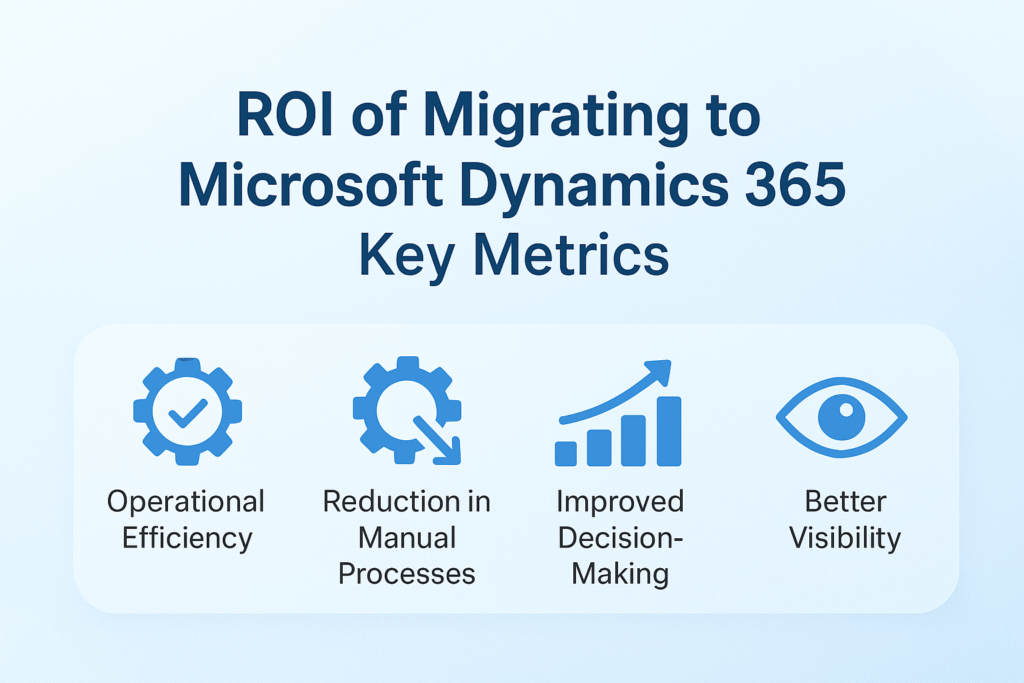In today’s competitive digital landscape, businesses are constantly seeking ways to maximize efficiency, enhance customer experiences, and improve overall profitability. One of the most impactful transformations organizations can undertake is migrating to Microsoft Dynamics 365 — a unified platform that combines ERP and CRM functionalities to streamline operations and deliver actionable insights. But what is the real ROI of migrating to Microsoft Dynamics 365, and what metrics should you measure to justify the investment?
As a trusted Microsoft Dynamics 365 ERP CRM Partner, DynamicsSmartz has helped numerous enterprises realize tangible business benefits from their migration journey. Let’s break down the key areas where ROI is typically seen.

1. Operational Efficiency
Migrating to Microsoft Dynamics 365 simplifies workflows and automates repetitive tasks, helping teams accomplish more in less time. By integrating business processes—from sales and finance to supply chain and customer service, companies experience a dramatic reduction in data silos and process redundancies.
Metric to Measure: Compare process completion time, task automation rates, and system uptime before and after implementation.
A client from the manufacturing sector shared, “Dynamics 365 helped us cut down reporting time by nearly 40% and improved our order fulfillment accuracy,” highlighting how streamlined operations directly translate to higher productivity.
2. Reduction in Manual Processes
Manual data entry and disconnected legacy systems are major roadblocks to business growth. Microsoft Dynamics 365 automates these processes through AI-driven insights, predictive analytics, and real-time synchronization between departments.
Metric to Measure: Reduction in manual data handling, error rates, and time spent on repetitive administrative tasks.
According to a recent DynamicsSmartz client success story, an FMCG brand achieved a 30% reduction in administrative overhead after automating financial reporting and inventory management.
3. Improved Decision-Making
Dynamics 365 provides leaders with unified dashboards and advanced analytics for data-backed decision-making. The integration with Power BI enables predictive modeling, allowing businesses to identify opportunities and risks faster.
Metric to Measure: Speed and accuracy of decision-making, forecasting accuracy, and ROI on data-driven initiatives.
“With Dynamics 365 and Power BI integration, we now have complete visibility into our sales pipeline and can make faster, informed business decisions,” noted a client in the professional services sector.
4. Better Business Visibility
One of the most compelling benefits of migrating to Dynamics 365 is enhanced visibility across all business units. Real-time data accessibility enables proactive management and fosters collaboration.
Metric to Measure: Data transparency across departments, real-time reporting capabilities, and cross-functional collaboration improvements.
Final Thoughts
Migrating to Microsoft Dynamics 365 is not just a technological upgrade—it’s a strategic business decision. By measuring key performance indicators like operational efficiency, automation gains, decision-making speed, and visibility, organizations can clearly see the return on investment.
As a Microsoft Dynamics 365 ERP CRM Partner, DynamicsSmartz has a proven track record of helping businesses quantify and achieve measurable ROI through tailored implementation strategies.
Looking to assess the ROI of your Dynamics 365 migration? Reach out to DynamicsSmartz today for a personalized consultation or to get a client success quote to strengthen your business case.
Related Reads
- Custom Fitness App Development: Build the Fitness App Your Users Actually Want
- Car Title Loans in Vancouver, BC: Your Fast Track to Instant Cash
- Tent City Awaits: Make Your Reservations for Rann Utsav 2025-26
- A Strategic Guide to the Performance of Diesel Engine Parts
- Wedding Tents on Rent: Elevate Your Celebration with Shridhar Tent House
- Best Septoplasty Surgeon in Dubai for Breathing and Cosmetic Correction



